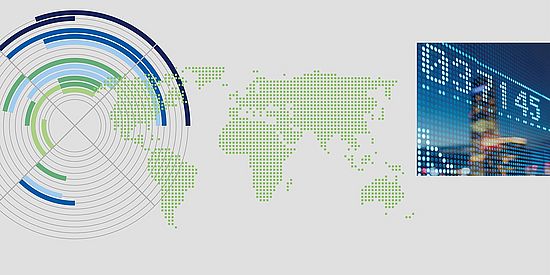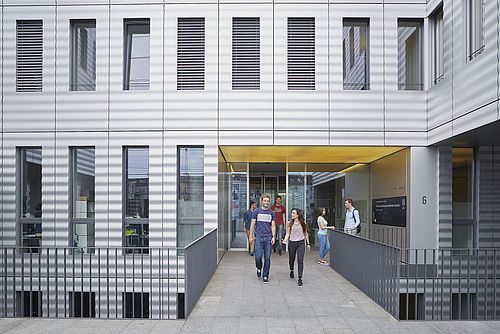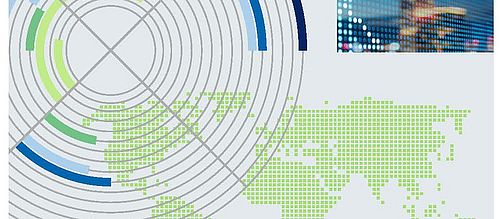
Master of Science in International and Monetary Economics
The Master in International and Monetary Economics (MIME) is a joint, specialized master’s degree offered by the Universities of Basel and Bern. It aims to help students acquire a strong background and analytical expertise in monetary economics, macroeconomics and international macroeconomics. MIME graduates are trained to take positions requiring analytical skills and macroeconomic knowledge, such as those found in banks, monetary and fiscal authorities, general government, international companies and organizations, research institutes and doctoral programs.
Key facts:
- Joint degree program organized by the Universities of Basel and Bern
- Excellent career opportunities in industry, administration and academia Transition to a related doctoral program
- Taught exclusively in English
- Internationally renowned faculty
- International student body
- 3 semesters (full-time)
- Attractive location in the heart of Europe
The content of this website is primarily designed for applicants who are interested in applying at the University of Basel and students who are enrolled at the University of Basel. Further information can be found on the joint website and the website of the University of Bern.
In the context of the field of academic activities described above, the skills to be acquired are clearly outlined. Graduates of the MIME Master’s programme should
- understand the role of central banks and banking supervision for macroeconomic stability; in particular, with regard to the system’s international embedding
- understand the role that central banks, banking supervisory and regulatory bodies, as well as private investors (commercial banks, institutional investors, etc.) play in the international finance market
- have gained the competence to prepare or assess monetary policy decisions based on optimal academic criteria
- be acquainted with the historical background of international economic developments
- know the approaches to monetary policy and financial market regulation
- be equipped to reflect and comment on policy discussions and issues in this context
Graduates of this Master’s programme would seek professional career openings in the following areas:
- Macroeconomic analysis with reserve banks and commercial banks
- Public authorities (e.g., finance or tax administrations)
- Financial market supervisory bodies
- Media communications
- Expert groups of political governing boards or international organizations,
- Academia
Want to know what recent MIME graduates are doing today? Check it out here!
The curriculum covers the foundation module, the core module and the specialization module (including supplementary courses) as well as the master’s thesis.
Foundation module: Avanced topics in economics
The foundation module accounts for a total of 18 ECTS. It has the goal of bringing all students up to the same level. It has a broad base and covers the basic elements of the master’s economics program (microeconomics, macroeconomics and econometrics). The courses for this module are offered at both universities alongside the standard Master’s program. Apart from offering the choice of where to study the individual courses, this module does not offer any choices regarding course selection and has to be completed at the home university.
Core module: Core areas in monetary economics
In the core module, the student has to gain 24 ECTS. It contains specific courses covering the key topics of this specialized master’s program. The module guarantees that the study objectives listed in Section 4 are achievable. The module also covers a seminar in which students have to compile and present a seminar paper (6 ECTS). This seminar is conducted by the faculty members of the participating faculties and may also draw on experts from professional fields and potential future employers. Typically, the courses of this module are only offered at one of the two universities so that students are obliged to commute. The module offers only a narrow choice of options. The exact composition of the module is to be laid down by the Governing Board.
Specialization module: Areas of specialization in international and/or monetary economics
In the specialization module, 18 ECTS have to be gained. Here, from a wide variety of master’s courses offered by both faculties, students can choose topics that are suited to the increased specialization of their targeted qualification. This module may also include courses which are offered outside the faculty. In this specialization module, courses that are not held in English may also be considered. The objective of this module is to offer students the opportunity to characterize their study profile in line with their personal interests or career ambitions. Here, the Curriculum Board has the function of ensuring that the content of such choices is aligned to the MIME objectives. The Governing Board will compile a list containing courses specifically for the purposes of this module in the medium-term lecture scheme. Core module courses may also be attended and counted in the specialization module if the student has already completed the core module with the required number of points.
Master's thesis
Please have a look here.
Which lectures are part of the program? Have a look!
Need a timetable to plan your semester?
All you need to know about the master's thesis.
Admission to the specialized Master's degree program in International and Monetary Economics (MIME) requires a Bachelor of Arts in Business and Economics from the University of Basel or a Bachelor's degree degree from a university recognized by the University of Basel with proof of equivalent academic achievements in the field of economics and quantitative methods. The equivalence in this respect is assessed by the examination board.
The following condition must also be met:
The bachelor’s degree relevant for admission must have an average grade of at least 5 / unrounded (Swiss grading system 1 to 6, where 6 = max./4 = pass). Conversion calculator
As an alternative to the minimum GPA, holders of a bachelor’s degree from a recognized university-level higher education institution may present a current Graduate Record Examination® General Test (or GRE® Test), provided the results in the areas of “Quantitative Reasoning” and “Analytical Writing” are among the top 30% at least.
The Master in International and Monetary Economics is designed as a 3 semester (30 ECTS per semester) program starting in fall. However, registration is possible either in fall or spring semester. Part-time study increases the duration of the program accordingly.
Application
Please register here.
Application deadline for fall semester: April 30.
Application deadline for spring semester: November 30.
Fees
Application fee: CHF 100.
Tuition fees per semester: CHF 850.
Individual costs of living etc. are not included.
Scholarships
Parents and/or the cantonal scholarship office in the parents’ canton of residence are basically responsible for the funding of studies, and the appropriate applications should be submitted there. International students should find out what scholarships they are eligible for in their home country. For more details, see here.
- Students enrolled at the University of Basel register for exams (only, registration for classes usually not mandatory) in Bern via the online tool CTS (KSL). They have usually already received their campus account login from the University of Bern: https://www.ksl-vv.unibe.ch/KSL/veranstaltungen
- There is not really an English User Guide for CTS (KSL) available yet; but under support on the above mentioned website, there are several possibilities.
- Detailed information about the new system can be found here.
- The grades will be transferred directly from the University of Bern to the University of Basel.
- If you have any questions concerning the courses in Bern, you can contact at the University of Basel: Beat Spirig (beat.spirig@clutterunibas.ch) or at the University of Bern: Sally Dubach (sally.dubach@clutterunibe.ch)
- Students enrolled in Bern have to fill in a special form from the University of Basel called “Belegschein”. This form can be picked up at the office A 323 UniS. The students will then be directly registered for the lectures and the exams.
- After filling the form in, students must hand it in to Fiona Scheidegger (office A323). This has to be done in the beginning of each semester.
- Fiona Scheidegger then forwards the form to Basel.
- Registration for seminars and block courses: in addition to the registration via the form, send an e-mail to studiendekanat-wwz@clutterunibas.ch
- Important (this is different to Bern): After registration, it is not possible to deregister for the exams. Further, there is only one date for the exam. If a student does not pass an exam, he/she can repeat it only one year later when the lecture is offered the next time. Students enrolled in Bern will receive an e-mail address from the University of Basel. The grades will be announced via this e-mail address. MIME students enrolled in Bern will not have access to the MonA-Account (online tool in Basel for registration).The grades will be transferred directly from Basel to Bern.
In order to complete your studies, you must register for graduation. Please note the registration dates.
If you do not apply for graduation, we have to assume that you still want to continue your studies.
Study Regulation and Guide
Contact

Dean of Studies' Office, Dr. Beat Spirig
University of Basel
Faculty of Business and Economics
Peter Merian-Weg 6, Office 38 (Gr. Floor)
CH-4002 Basel
Quick Links
Social Media

